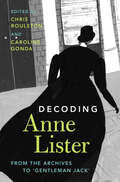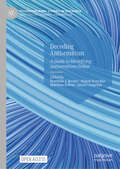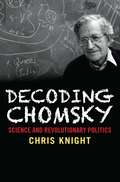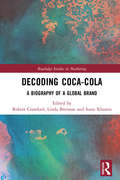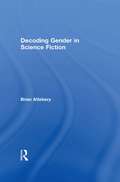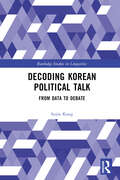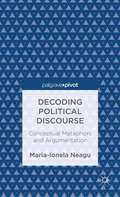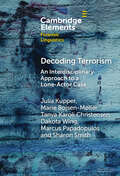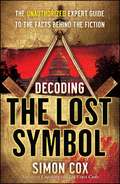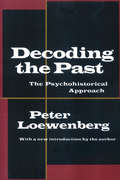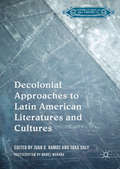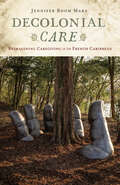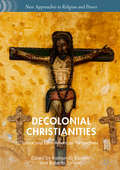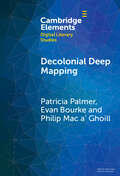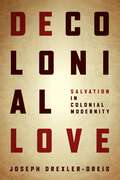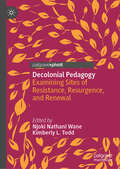- Table View
- List View
Decodable Reader
by Inc. Isabel L. Beck Margaret Mckeown Robin Scarcella Action Learning SystemsNIMAC-sourced textbook
Decodable Stories Takehome Books Blackline Masters Level 3 [Grade 3]
by Mcgraw Hill Wright GroupNIMAC-sourced textbook
Decodable Stories Takehome Books, Blackline Masters, Level 2 [Grade 2]
by McGraw-HillNIMAC-sourced textbook
Decoding Anne Lister: From the Archives to ‘Gentleman Jack'
by Caroline Gonda Chris RoulstonThis is the first edited collection of essays on the nineteenth-century diarist Anne Lister. Now recognized as a UNESCO world heritage document, Lister's five-million-word diaries are paradigm-shifting in terms of their range of material, from social commentary and politics to breath-taking travel accounts. However, they have become most well-known for their explicit descriptions of same-sex practices, written in code and constituting a significant portion of their content. The essays here address the variety and interdisciplinarity of the diaries: Lister's negotiations with her own 'odd' identity, her multiple same-sex relationships, her involvement in politics and her lifelong thirst for knowledge. It also addresses Lister studies in popular culture through the successful Gentleman Jack BBC-HBO series, including an interview with Sally Wainwright and foreword by author Emma Donoghue. This title is part of the Flip it Open Programme and may also be available Open Access. Check our website Cambridge Core for details.
Decoding Antisemitism: A Guide to Identifying Antisemitism Online (Postdisciplinary Studies in Discourse)
by Matthew Bolton Matthias J. Becker Hagen Troschke Alexis ChapelanThis open access book is the first comprehensive guide to identifying antisemitism online today, in both its explicit and implicit (or coded) forms. Developed through years of on-the-ground analysis of over 100,000 authentic comments posted by social media users in the UK, France, Germany and beyond, the book introduces and explains the central historical, conceptual and linguistic-semiotic elements of 46 antisemitic concepts, stereotypes and speech acts. The guide was assembled by researchers working on the Decoding Antisemitism project at the Centre for Research on Antisemitism at Technische Universität Berlin, building on existing basic definitions of antisemitism, and drawing on expertise in various fields. Using authentic examples taken from social media over the past four years, it sets out a pioneering step-by-step approach to identifying and categorising antisemitic content, providing guidance on how to recognise a statement as antisemitic or not. This book will be an invaluable tool through which researchers, students, practitioners and social media moderators can learn to recognise contemporary antisemitism online – and the structural aspects of hate speech more generally – in all its breadth and diversity.
Decoding Chomsky: Science and Revolutionary Politics
by Chris KnightA fresh and fascinating look at the philosophies, politics, and intellectual legacy of one of the twentieth century's most influential and controversial minds Occupying a pivotal position in postwar thought, Noam Chomsky is both the founder of modern linguistics and the world's most prominent political dissident. Chris Knight adopts an anthropologist's perspective on the twin output of this intellectual giant, acclaimed as much for his denunciations of US foreign policy as for his theories about language and mind. Knight explores the social and institutional context of Chomsky's thinking, showing how the tension between military funding and his role as linchpin of the political left pressured him to establish a disconnect between science on the one hand and politics on the other, deepening a split between mind and body characteristic of Western philosophy since the Enlightenment. Provocative, fearless, and engaging, this remarkable study explains the enigma of one of the greatest intellectuals of our time.
Decoding Coca-Cola: A Biography of a Global Brand (Routledge Studies in Marketing)
by Robert CrawfordThis collection of essays delves into the Coke brand to identify and decode its DNA. Unlike other accounts, these essays adopt a global approach to understand this global brand. Bringing together an international and interdisciplinary team of scholars, Decoding Coca-Cola critically interrogates the Coke brand as well its constituent parts. By examining those who have been responsible for creating the images of Coke as well as the audiences that have consumed them, these essays offer a unique and revealing insight into the Coke brand and asks whether Coca-Cola is always has the same meaning. Looking into the core meaning, values, and emotions underpinning the Coca-Cola brand, it provides a unique insight into how global brands are created and positioned.This critical examination of one of the world’s most recognisable brands will be an essential resource for scholars researching and teaching in the fields of marketing, advertising, and communication. Its unique interdisciplinary approach also makes it accessible to scholars working in other humanities fields, including history, media studies, communication studies, and cultural studies.
Decoding Gender in Science Fiction
by Brian AtteberyFrom Frankenstein to futuristic feminist utopias, Decoding Gender in Science Fiction examines the ways science fiction writers have incorporated, explored, and revised conventional notions of sexual difference. Attebery traces a fascinating history of men's and women's writing that covertly or overtly investigates conceptions of gender, suggesting new perspectives on the genre.
Decoding Korean Political Talk: From Data to Debate (Routledge Studies in Linguistics)
by Sujin KangThis book offers an illuminating exploration into the complex world of political communication in South Korea from 2016 to 2021.Through an in-depth analysis of 34 political conversations totalling over 275 hours, this book presents a groundbreaking interdisciplinary study combining quantitative and qualitative methods. It delves into the intricate design and strategic use of questions and answers in political dialogue, shedding light on the underlying rhetoric, strategy, and power dynamics. By examining the seismic shifts in South Korea's political landscape, including a major political scandal, the impeachment of the president, North–South relations, and the COVID-19 pandemic, this work presents a unique perspective on how political conversations shape, and are shaped by, societal and global events. It is a vital contribution to the study of Korean linguistics, offering tools and frameworks for analyzing political dialogue in a political setting.An indispensable resource for scholars and students in the fields of linguistics, political science, communication studies, and Asian studies, as well as political enthusiasts and professionals engaged in diplomatic and governmental sectors. It offers readers insights into the nuanced strategies of political discourse, enhancing their understanding of how language shapes politics and vice versa.
Decoding Political Discourse: Conceptual Metaphors and Argumentation
by Maria-Ionela NeaguThis book provides an in-depth look into the cognitive and argumentative nature of political discourse with a focus on the role and place of conceptual metaphors in practical argumentation. Neagu's empirical investigation centres on the corpus of the American Presidential debates in 2008 and speeches by Barack Obama from 2009-2011.
Decoding Terrorism: An Interdisciplinary Approach to a Lone-Actor Case (Elements in Forensic Linguistics)
by Julia Kupper Marie Bojsen-Møller Tanya Karoli Christensen Dakota Wing Marcus Papadopulos Sharon SmithThis Element is an interdisciplinary analysis of the language evidence produced before, during and following a lone-actor terrorism attack in Halle, Germany, on October 9, 2019, resulting in two casualties. During his final preparations, the perpetrator, twenty-seven-year-old Stephan Balliet, announced his attack online and disseminated a targeted violence manifesto shortly before live-streaming his violent act. This post-hoc investigation introduces a multi-method approach that synchronizes well-established qualitative methodologies for forensic text analysis – genre, text linguistics, appraisal and uptake – to elucidate these data types. Furthermore, a retroactive threat assessment based on language data from the trial transcripts provides a holistic review of the assailant's background, red flags, triggering events and warning behaviors that could have signaled his movements along the pathway to violence. The results are considered in an organizational context to highlight current challenges faced by security agencies when mitigating the risk of lone-actors who radicalize in online environments.
Decoding The Lost Symbol: The Unauthorized Expert Guide to the Facts Behind the Fiction
by Simon CoxNow a Peacock Original TV series Secret societies. Forgotten history. Conspiracies. Now you can unlock the mysteries of Dan Brown&’s The Lost Symbol with this definitive and bestselling guide to the facts behind the fiction featuring Harvard symbologist Robert Langdon—from Simon Cox, author of Cracking the Da Vinci Code and Illuminating Angels and Demons.Dan Brown&’s thrilling novel The Lost Symbol again features Harvard symbologist Robert Langdon, this time in the US racing to uncover clues and crack codes involving secrets that are perpetuated to this day. But how much of the novel is true and what is pure fiction? Simon Cox, bestselling Dan Brown expert offers this definitive guide to all the mysteries featured in The Lost Symbol. Based on extensive research, this A-to-Z guide lists the real people, organizations, and themes featured in Dan Brown&’s novel, explains their histories and their meanings, reproduces and analyzes the symbols themselves, and provides insider knowledge gleaned from years of exhaustive study. From the monuments of Washington, DC, to the secrets of Salt Lake City and the hidden enclaves in Langley, Virginia, Cox knows where the facts are hidden about the Freemasons, Albert Pike, the Rosicrucians, the Founding Fathers, and more. This is the only resource you&’ll need to understand and enjoy the fascinating and mysterious world of The Lost Symbol.
Decoding the Past: The Psychohistorical Approach
by Peter LoewenbergIn Decoding the Past, Peter Loewenberg has collected eleven of his brilliant essays on psychohistory, a discipline that has emerged from the synthesis of traditional historical analysis and clinical psychoanalysis. He surveys this relatively new field its methods and its problems to show the special contributions that psychoanalysis can make to history. He then further explores the psychohistorical method by applying it to studies of personality, cultures, groups, and mass movements, demonstrating that psychohistory offers one of the most powerful of interpretive approaches to history.Decoding the Past is an impressive study that demonstrates the range of Loewenberg's own work in history and psychoanalysis and the full promise of an important and innovative methodology for others. His new essay takes up many of the criticisms and concerns raised about the method of psychohistory, and offers a cogent defense for its continued usage.
Decolonial Approaches to Latin American Literatures and Cultures
by Juan G. Ramos Tara DalyDecolonial Approaches to Latin American Literatures and Cultures engages and problematizes concepts such as "decolonial" and "coloniality" to question methodologies in literary and cultural scholarship. While the eleven contributions produce diverse approaches to literary and cultural texts ranging from Pre-Columbian to contemporary works, there is a collective questioning of the very idea of "Latin America," what "Latin American" contains or leaves out, and the various practices and locations constituting Latinamericanism. This transdisciplinary study aims to open an evolving corpus of decolonial scholarship, providing a unique entry point into the literature and material culture produced from precolonial to contemporary times.
Decolonial Care: Reimagining Caregiving in the French Caribbean (Critical Caribbean Studies)
by Jennifer Boum MakeDecolonial Care examines the relationship between the legacies of colonialism and the dynamics of caregiving that have emerged from the French Caribbean. Through a variety of media, including novels, graphic narratives, and curatorial discourse, this book explores four key contexts at the intersection of care and colonialism: care-focused gender roles, domestic service, nurturing human life and environments, and curation as caring. Decolonial Care argues that to imagine caregiving in the context of the French Caribbean means reckoning with intrinsically uncaring practices inherited from colonial rule that show disregard for human life and environments. Putting in dialogue postcolonial studies and care studies, this book elucidates how caring and uncaring have been historically shaped by colonialism, showing how media and narratives about the French Caribbean document the damaging impact of colonialism but also help develop decolonial approaches to care that sustain human life and livable environments.
Decolonial Christianities: Latinx and Latin American Perspectives (New Approaches to Religion and Power)
by Raimundo Barreto Roberto SirventWhat does it mean to theorize Christianity in light of the decolonial turn? This volume invites distinguished Latinx and Latin American scholars to a conversation that engages the rich theoretical contributions of the decolonial turn, while relocating Indigenous, Afro-Latin American, Latinx, and other often marginalized practices and hermeneutical perspectives to the center-stage of religious discourse in the Americas. Keeping in mind that all religions—Christianity included—are cultured, and avoiding the abstract references to Christianity common to the modern Eurocentric hegemonic project, the contributors favor embodied religious practices that emerge in concrete contexts and communities. Featuring essays from scholars such as Sylvia Marcos, Enrique Dussel, and Luis Rivera-Pagán, this volume represents a major step to bring Christian theology into the conversation with decolonial theory.
Decolonial Deep Mapping (Elements in Digital Literary Studies)
by Patricia Palmer Evan Bourke Philip Mac a' GhoillDeep maps capture complex relationships to place and help trace the relationship between the abstract spaces of traditional maps and the cultural and literary history of the places that they represent. Using early modern Ireland as a template, this Element explores how deep-mapping techniques and a decolonial data ethic can be used to assemble a more culturally and linguistically representative archive and create more inclusive literary histories. It shows how deep mapping can disrupt colonial teleology and counter the monophone (and, specifically, anglophone) colonial record by bringing the long-neglected voices of the colonised back into the conversation. In doing so, it recovers a pre-conquest cultural vibrancy which colonisation, the language shift from Irish to English, and scholarly inattention successively occluded. More broadly, it offers a model for engaging with decolonial literary deep maps by developing reading strategies for 'juxtapuntal' reading that has the potential to decolonise the canon.
Decolonial Love: Salvation in Colonial Modernity
by Joseph Drexler-DreisBringing together theologies of liberation and decolonial thought, Decolonial Love interrogates colonial frameworks that shape Christian thought and legitimize structures of oppression and violence within Western modernity. In response to the historical situation of colonial modernity, the book offers a decolonial mode of theological reflection and names a historical instance of salvation that stands in conflict with Western modernity. Seeking a new starting point for theological reflection and praxis, Joseph Drexler-Dreis turns to the work of Frantz Fanon and James Baldwin. Rejecting a politics of inclusion into the modern world-system, Fanon and Baldwin engage reality from commitments that Drexler-Dreis describes as orientations of decolonial love. These orientations expose the idolatry of Western modernity, situate the human person in relation to a reality that exceeds modern/colonial significations, and catalyze and authenticate historical movement in conflict with the modern world-system. The orientations of decolonial love in the work of Fanon and Baldwin—whose work is often perceived as violent from the perspective of Western modernity—inform theological commitments and reflection, and particularly the theological image of salvation.Decolonial Love offers to theologians a foothold within the modern/colonial context from which to commit to the sacred and, from a historical encounter with the divine mystery, face up to and take responsibility for the legacies of colonial domination and violence within a struggle to transform reality.
Decolonial Pedagogy: Examining Sites of Resistance, Resurgence, and Renewal
by Njoki Nathani Wane Kimberly L. ToddThrough innovative and critical research, this anthology inquires and challenges issues of race and positionality, empirical sciences, colonial education models, and indigenous knowledges. Chapter authors from diverse backgrounds present empirical explorations that examine how decolonial work and Indigenous knowledges disrupt, problematize, challenge, and transform ongoing colonial oppression and colonial paradigm. This book utilizes provocative and critical research that takes up issues of race, the shortfalls of empirical sciences, colonial education models, and the need for a resurgence in Indigenous knowledges to usher in a new public sphere. This book is a testament of hope that places decolonization at the heart of our human community.

